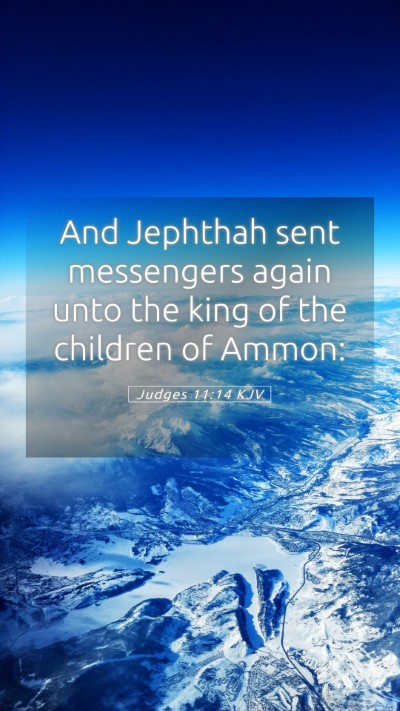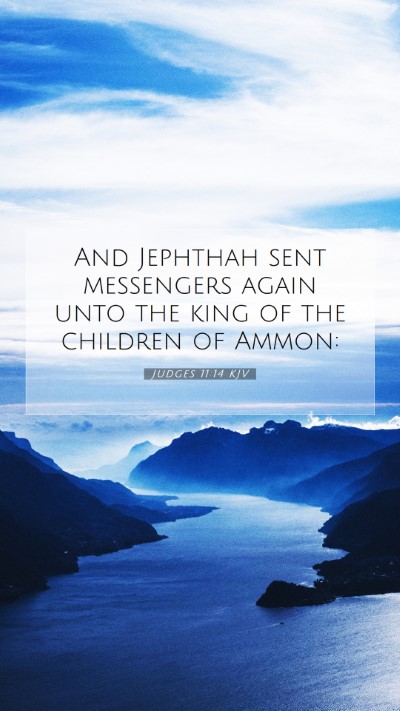Understanding Judges 11:14
Bible Verse: Judges 11:14
“Then Jephthah sent messengers to the king of the Ammonites and said, 'What do you have against me that you have come to fight against me in my own land?'”
Overview of the Verse
This verse captures a moment of tension between Jephthah, who had been appointed as a leader and judge in Israel, and the Ammonite king, who was waging war against Israel. Jephthah's inquiry reflects not only his leadership but also the complex historical and territorial disputes that characterized this period in the Old Testament.
Commentary Insights
-
Matthew Henry:
Henry emphasizes Jephthah’s role as a courageous leader who approaches conflict with a dialogue rather than immediate aggression. This approach indicates a desire for understanding and peace amidst threats, showcasing a wise and poised leadership characteristic. He points out that Jephthah seeks clarity about the grounds for their conflict, underlining the importance of communication before acts of war.
-
Albert Barnes:
Barnes highlights the significance of Jephthah’s position as an outsider who became a leader in Israel. His question to the Ammonite king serves as a diplomatic first step that reflects Jephthah’s awareness of the seriousness of the situation. Barnes discusses how this moment underscores the reality of territorial rights and historical grievances that fuel conflicts, encouraging readers to appreciate the historical context behind Jephthah’s leadership.
-
Adam Clarke:
Clarke elaborates on the historical backdrop of the conflict between Israel and Ammon, noting the longstanding animosities and territorial claims. He points out that Jephthah’s message is a call for reflection on the reasons for war; it encourages a consideration of justice and the moral implications of such disputes. Clarke further discusses how the verse sets the stage for Jephthah's subsequent actions and decisions.
Key Themes and Applications
This verse introduces several key themes for readers looking for understanding and insights:
- Leadership and Communication: Jephthah exemplifies a type of leadership that prioritizes dialogue over confrontation. This serves as a valuable lesson for modern readers in how to approach conflict.
- Historical Context: Understanding the historical background of the Israelites and the Ammonites provides deeper insight into the complexities behind the questions raised by Jephthah.
- Moral Reflection: Jephthah’s inquiry reflects a broader challenge of evaluating the justification for war and the moral implications of actions taken in the heat of conflict.
Bible Study Insights
For those engaging in Bible study groups or online Bible studies, this verse serves as a starting point for discussions on various topics:
- How to interpret Bible verses regarding conflict resolution.
- The role of leadership in difficult situations and the importance of clear communication.
- The historical context of Israelite and Ammonite relations and its implications for understanding the Old Testament narrative.
Cross References
This verse relates to several other biblical passages that enrich its meaning:
- Numbers 21:24-25: The conflict between Israel and Amorites.
- Deuteronomy 2:19: Instructions regarding the land of the Ammonites.
- 1 Samuel 11:1: The need for a leader during times of crisis.
Conclusion
Judges 11:14 offers profound lessons in leadership, the gravity of communication, and the need for moral reflection in the face of conflict. It challenges readers to engage deeply with Scripture and understand not just the context of the times, but also the timeless principles that can be applied to our lives today.


